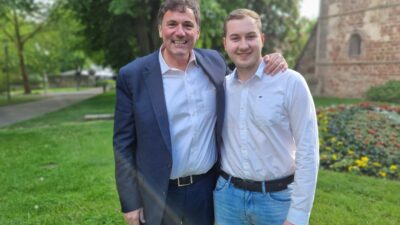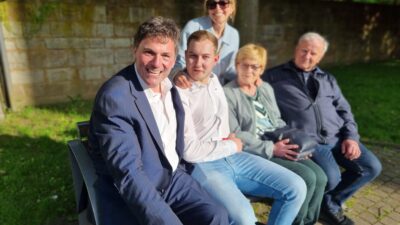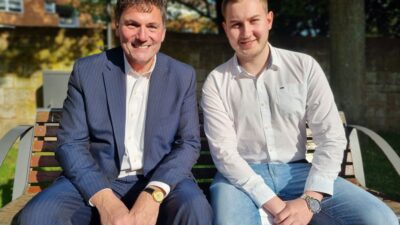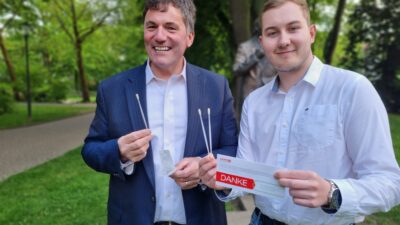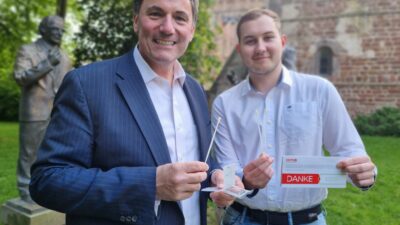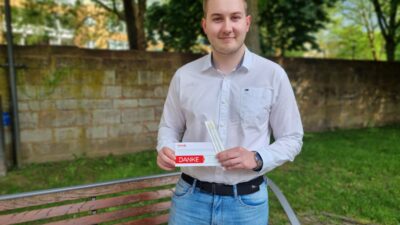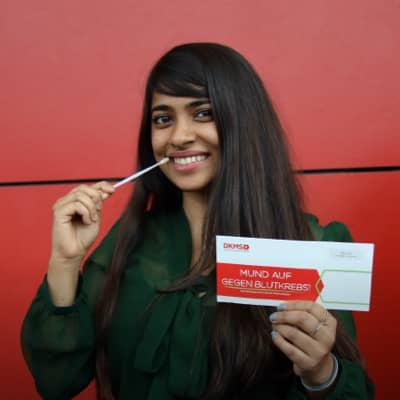Canadian minister visits his lifesaver in Bad Hersfeld
“I’m very, very happy to be here. I have been looking forward to this visit for the past two years.”
What a moving and heartfelt reunion: At the end of May, Dominic LeBlanc visited his lifesaver Jonathan and his family in Bad Hersfeld, Hesse. The student had given the 55-year-old a second chance at life a few years ago with a stem cell donation. Thanks to this, the Canadian politician is doing well again. Dominic LeBlanc and Jonathan Kehl had met in person for the first time a few months ago. The student had traveled to Canada especially for this purpose. Now the return visit took place - once again it was an unforgettable encounter for both of them.
“We have a connection that will last for the rest of our lives,” Dominic LeBlanc says. “I am very lucky, I am very well! I have a checkup every 6 months at the hospital in Montreal where they did the transplant. I was there two months ago and they did all the blood tests and pet-scan last fall and it’s all good.”
Together with Jonathan, he walks through Bad Hersfeld and tells his very personal story of illness. „I wouldn’t be standing here today, if it wasn’t for what Jonathan did and for what science in Germany does.”
Dramatic years lie behind the 55-year-old. In 2017, Dominic LeBlanc was diagnosed with non-Hodgkin’s lymphoma and had to temporarily rest his political duties. Sometime later it was clear that he needed a stem cell transplant. The worldwide search was started and the suitable „match“ was found in Jonathan Kehl, who is studying to be a teacher in Kassel.
In 2017, at just 17 years old, he had signed up with DKMS as a potential donor. In 2019, he received a message that would change his life forever: He was eligible as a stem cell donor for a patient. Shortly after the donation, he was informed that his stem cells had been sent to a man in Canada. What he didn’t know at the time: With his donation, Jonathan had given Dominic LeBlanc from Moncton, New Brunswick, a second chance at life.
After the two-year period of anonymity, the politician contacted Jonathan with an emotional letter. “The doctors in Montreal had told me that you had to wait two years after the transplant and the donor had to give his consent, of course, to have his or her identity revealed. So two years and a month after the transplant, I was actually driving between Montreal and our capital city, Ottawa. And I was looking at my emails and I saw an email from the hospital in Montreal where I had received the transplant. And it said, as per your request, here’s the information on your donor. And that’s the first time I saw Jonathan Kehl’s name, I saw his date of birth,” he remembers. “What struck me on the information I got is that he was born in 1999. I didn’t imagine that the donor would have just been 20 years old when he donated the stem cells. But it gave me his address in Bad Hersfeld in Germany, his phone number, his email. So right away, of course, with one of my assistants who was in the car with me, we started to google Bad Hersfeld.”
Video calls followed, and then recently the first face-to-face meeting took place. Jonathan had traveled to Canada especially for this purpose and got to know Dominic’s home country and his family. For Jonathan, it was particularly gratifying to receive such a warm welcome from Dominic’s wife and stepson. “I was welcomed with open arms and we connected immediately. They cooked for me and we shared stories about each other’s families.”Therefore, he was very happy to invite them to Bad Hersfeld in return.
Jonathan met Dominc’s colleagues and friends. One of those colleagues is Justin Trudeau, the Canadian Prime Minister, in whose cabinet Dominic LeBlanc serves as Minister of Intergovernmental Affairs, Infrastructure and Communities – and about whom there is a nice story to report. “The Prime Minister told chancellor Scholz when he was in Canada a little while ago that I was the only minister of the Canadian government with 100% German blood – thanks to Jonathan from Bad Hersfeld”, Dominic LeBlanc says.
Unforgettable hours with Jonathan’s family
A few months later, Dominic LeBlanc traveled to the small town in Hesse. The long-awaited meeting started at Jonathan’s parents‘ house, where Dominic LeBlanc and wife Jolène were warmly welcomed by Jonathan with his grandparents, parents and siblings. The coffee table was lovingly set and a specialty was served in their honor. “There was Black Forest cake – very tasty“, Dominic LeBlanc reports. “It’s not my first time in Germany but it’s my first time in Bad Herfeld. I’m very, very happy to be here. I have been looking forward to this visit for the past two years.”
The tour continued with a walk through Bad Hersfeld. Again and again, Dominic LeBlanc put his arm around Jonathan and beamed with joy. “Jonathan is my genetic twin. I owe him a great debt of gratitude. He saved my life thanks to his kindness and actions”, he says. “It feels very familiar and I have found a friend for life in Dominic”, Jonathan adds. And, how could it be otherwise – another meeting is being planned. Dominic LeBlanc has invited Jonathan and his complete family to Canada. “We’re sort of linked together genetically forever, so I hope we can have Jonathan’s family come and meet us in Canada this summer or in the next few months and I want to come back when we have more time on holiday.”
But before that, he had one more culinary wish. “I would love to eat a schnitzel. After all, I am the only minister in Canada in which 100 percent German blood now flows”, Dominic LeBlanc says with a twinkle in his eye. “I’ve always been a fan of German sausages and Schnitzel. Jonathan came to Canada and we went to some of the best steakhouses in Montreal and tonight we will hopefully have a wonderful German dinner with Jonathan and his family here in Bad Hersfeld.”
Sign up with DKMS – made simple and fast!
For the Canadian politician and Jonathan, it is an absolute matter of the heart to promote the topic of stem cell donation and to motivate as many people as possible to register as potential lifesavers. “German science and German generosity and DKMS save lives in Canada every week and around the world. It’s a remarkable thing that the German people are doing”, Dominic LeBlanc says.
Currently, more than 11.5 million potential donors are registered with DKMS in seven countries. In Germany alone, there are over 7.5 million people of diverse ethnicities registered. In Germany alone, almost 125,000 registered potential lifesavers will leave the data base this year due to age; in the coming years, this number will even increase.
The reason: After the 61st birthday, we are no longer allowed to list potential donors in the international search registers. Medical reasons are the decisive factor here. This means that new potential donors are urgently needed. “I can only recommend the registration to everyone. For me it was a very easy way to save a life. The procedure I had to go through was nothing compared to what someone who suffers from blood cancer, for example, has to endure, and the registration is really very simple”, is Jonathan’s appeal.
Therefore, DKMS urges all people between the ages of 17 and 55 to sign up as potential donors. Interested supporters can order a registration kit with detailed instructions any time online at www.dkms.de.The cheek swab is done easily and quickly. In the enclosed return envelope, the donor sends the cheek swab kit directly to the DKMS Life Science Lab. In this modern high-performance laboratory, the tissue characteristics are determined, which are made available for the worldwide donor search run.
The DKMS School Project – for even more chances at life
“That exact kit is what saved my life! When DKMS went to schools in Germany and asked young Germans to get swabbed and to be in the database that’s what saves lives in Canada and around the world and in Germany of course every day”, Dominic LeBlanc sums it up. “If Jonathan hadn’t used that kit six years ago in school, when DKMS had not asked the kids in school to get swabbed, I wouldn’t be standing here today, I would not have survived – it saves lives!”
For almost two decades, DKMS has been informing students at schools throughout Germany about blood cancer and stem cell donation in its educational project. Under the motto “Your type is needed!”, the organization also offers them the opportunity to sign up as potential stem cell donors.
The commitment of young people to DKMS is important. They are available as potential donors over a long period of time and, due to their age, usually have good physical prerequisites for a stem cell donation.
In addition to Germany, DKMS has entities in Chile, India, Poland, South Africa, the UK and the USA. Further info can be found here: www.dkms.org.
Those who live in Canada and would like to help can find more info at Canadian Blood Services at www.blood.ca/en.
All donor centers and registers worldwide please find here: www.wmda.org.
Das könnte Sie auch interessieren
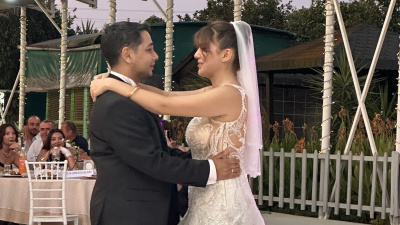
News in Spender & Patienten
Gerettet, gefeiert, verbunden
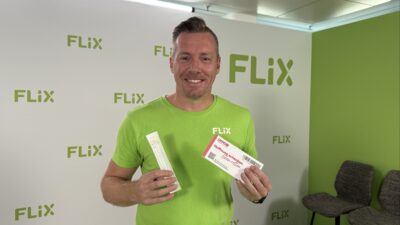
News in Partner & Netzwerk
„Deine Reise könnte ein Leben retten“
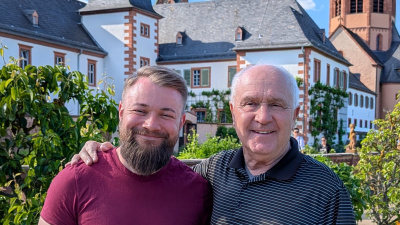
News in Spender & Patienten
Zeit – für Blutkrebspatient:innen und ihre Lieben das schönste Geschenk

News in Spender & Patienten
Arno und Nico sind Zwillinge – weil der eine dem anderen das Leben gerettet hat

